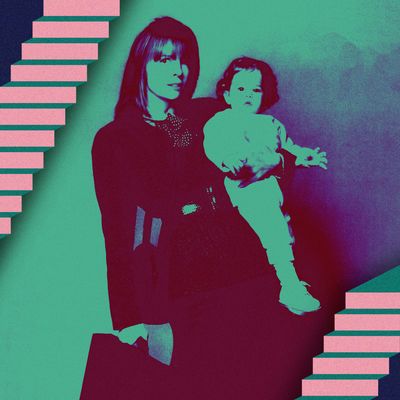
In this micro-series, the Cut revisits five Hollywood classics about female ambition.
It’s a tale as old as time: A woman whose entire identity is not wanting kids gets unexpectedly saddled with a kid; chaos ensues, followed closely by some sort of character development. In 1987, that formula gave us Baby Boom, a Nancy Meyers–penned comedy that follows J.C. Wyatt (Diane Keaton), a high-powered investment broker with a corner office and six-figure salary, whose life is derailed when she inherits a distant relative’s toddler.
The best part of Baby Boom, of course, is the Diane Keaton of it all. Namely, Keaton in power suits. It’s a little jarring to see her in such conservative corporate attire, given her signature offscreen collection of screwball menswear suits, but in the ‘’80s, no one could resist the allure of a shoulder pad and a wide belt. As J.C., Keaton manages to put her signature charm on full display even though the character is frankly kind of insufferable, and that, combined with one stunning Nancy Meyers kitchen, makes it a solid watch.
Once J.C. officially becomes a mother, Baby Boom makes its point about women in the workplace very clear. J.C. is meant to be a walking portrayal of what women with both children and jobs endure: Her colleagues — all male, save her secretary — furrow their graying brows when she whips out a formula bottle during her interview for a promotion. She feels guilty leaving her kid to go to work. Inevitably, she loses that promotion and nearly all her accounts, forcing her to quit and, inexplicably, lean so hard into domesticity that she moves to Vermont and starts making applesauce.
The resolution is supposed to show her finding some balance between those two poles: J.C. turns her applesauce habit into a successful baby food company, which lets her market herself as a mother and a businesswoman — and privately she’s able to juggle both of those commitments pretty smoothly. She even manages to score herself a sex life, thanks to a cute veterinarian who claims the two of them are the only people under 60 in the small Vermont town. As the movie is keen to point out, J.C. can have it all.
Of course, this isn’t quite the tidy solution that the movie thinks it is. I’m not sure what it means that J.C.’s entire business rests on her status as a capital-M mother, except that maybe the only way to have it all is to make your motherhood profitable. And while her life in Vermont is probably every Brooklynite’s wildest dream (myself included), it feels jarring when her yearning for her old life in New York suddenly dissipates. Shouldn’t “having it all” involve being able to have a child and also have the option of living in a city, working at a high-powered investment banking firm, and having friends?
Even if her new life is a successful example of working mother–dom, it’s also an utter fantasy — something critics at the time were quick to point out. Baby Boom was a solid commercial success: It debuted at No. 3 at the box office and was enough of a hit that NBC greenlit a short-lived TV show based on the film (sans Keaton), following J.C.’s ongoing antics as an investment banker raising a kid.
The critical responses largely dismissed its sobering take on working mothers — one called it a “glorified sitcom” — but most raved about Keaton and deemed it enjoyable on a surface level, which I’d say pretty much rings true today.
J.C. suffers what I would call a watered-down version of the challenges working mothers face. The most glaring advantage she has is wealth: Her quest to secure child care is not about affording it but finding a nanny she likes; she has the freedom to embrace domesticity by purchasing a house in Vermont; and when she runs out of money paying for house repairs, she gamely pivots to an immediately successful business that funds her repairs and more. J.C. exhibits a sort of snobbery about rural life that we’re supposed to empathize with. Her decision to keep the kid is largely driven by disgust at the fact that the couple hoping to adopt it lives in a trailer park, and at one point she calls her new Vermont environs a “moth-eaten town.” On top of the classism, there’s the fact that she’s white. Let’s just say Baby Boom only came out two years before the term intersectional feminism was coined, but it feels decades behind.
Still, even upper-middle-class white women like J.C. (and Meyers, who wrote the script shortly after giving birth to her first child) would likely struggle to reach the level of work-family balance on display here. There’s always an element of fantasy involved in rom-coms, but it also feels indicative of the mood surrounding female empowerment in 1987, particularly when it came to women in the workplace. The first line of the movie proudly asserts that 53 percent of the American workforce is female — “three generations of women moved out of the pink ghetto and into the executive suite” — and it makes sense that, at the dawning of an era where women could be CEOs, imagining a way to raise kids and keep your career was aspirational, even if not entirely realistic. Since then, “having it all” has become a joke more than something we strive for. I’m not sure anyone today can fantasize about what Baby Boom is selling.
Two years ago, the “all” of having it all — work, kids, social life, housework — got compressed into one never-ending nightmare for working mothers, who are still plugging away in a uniquely brutal pandemic-induced hell with no end in sight. Accordingly, pop culture is giving us not girlboss moms (i.e., the modern iteration of J.C.) but angry, fed-up mothers on the brink of collapse. In 2021, 57 percent of the workforce was female — the lowest it has been since 1988, which is only a year after Baby Boom came out. Back then, that number was exciting: If it had jumped 5 percentage points in one year, imagine what the future could hold. Now it’s downright bleak. Call me cynical, but all I could think about while J.C. paused a meeting to sing “Itsy Bitsy Spider” into a phone was how much worse the reality is for nonfictional working mothers.
Once she heads for Vermont, the movie largely loses track of J.C.’s working- mother woes, but there’s one scene that struck me as particularly poignant: reading a fairy tale to her toddler in bed, J.C. ad-libs an ending of her own. After the prince kisses the princess, in her version the princess thanks him for waking her up because she almost overslept for her med school class. “They made a date to meet after graduation,” she concludes. I wonder what J.C. imagines — or hopes — for her daughter if she chooses to have kids. That she’ll be able to keep her job, no matter where she works? That she won’t have to pay out of pocket for child care? Maybe she just wants her not to be pushed out of the workforce.
More From This Series
- Did Black Swan Predict the Plight of the Modern Worker?
- Love & Basketball Doesn’t Sacrifice Anything for the Happy Ending
- In Norma Rae It’s Worker Solidarity First, Ambition Second


